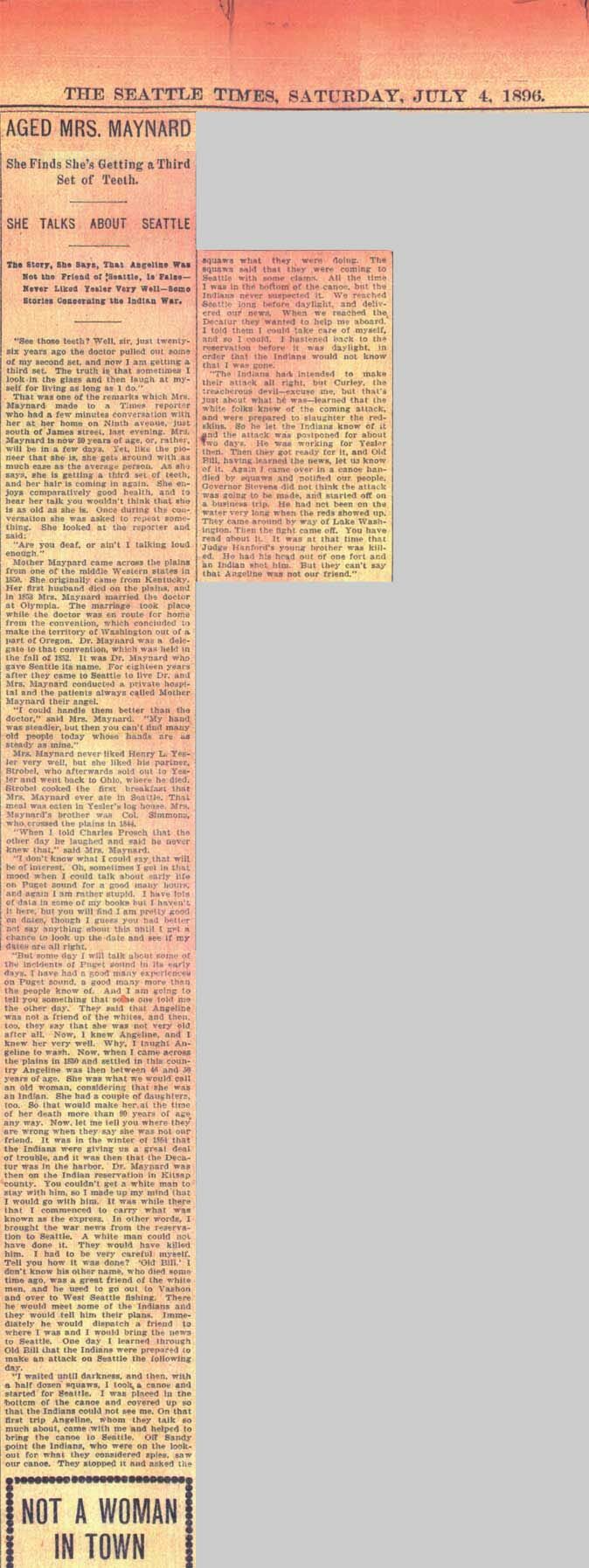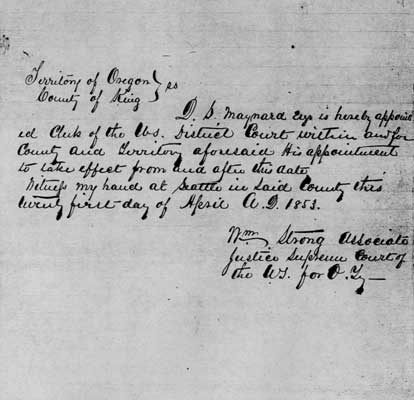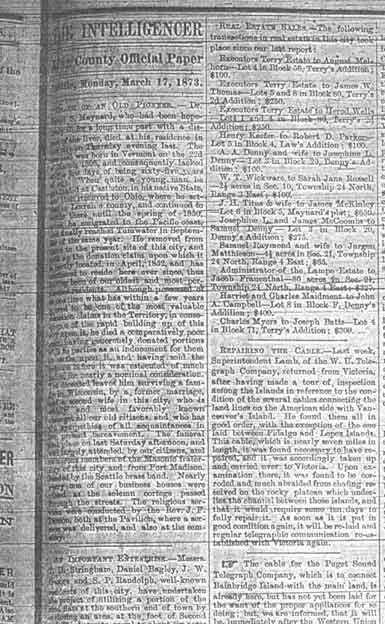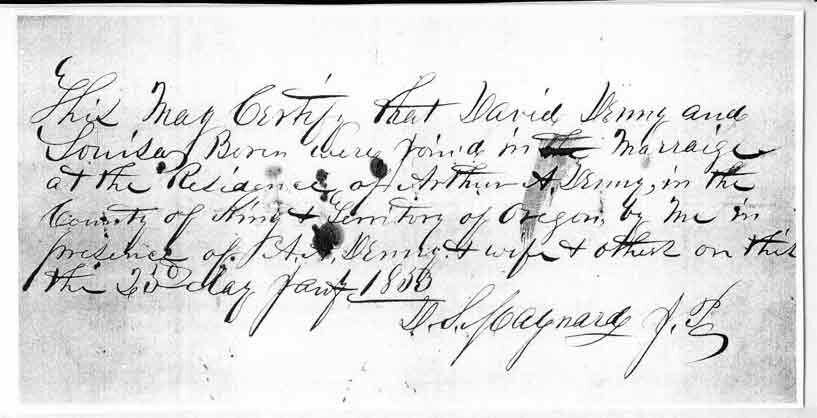 |
Interview with Catherine Maynard
July 4th, 1896
"See those teeth? Well, sir, just twenty-six years ago
the doctor pulled out some of my second set, and now I am getting a third
set. The truth is that sometimes I look in the glass and then laugh at
myself for living as long as I do."
That was one of the remarks which Mrs.
Maynard made to a Times reporter who had a few minutes conversation with
her at her home on Ninth avenue, just south of James street, last evening.
Mrs. Maynard is now 80 years of age, or, rather, will be in a few days.
Yet, like the pioneer that she is, she gets around with as much ease as
the average person. As she says, she is getting a third set of teeth, and
her hair is coming in again. She enjoys comparatively good health, and to
hear her talk you wouldn't think that she is as old as she is. Once during
the conversation she was asked to repeat something. She looked at the
reporter and said:
"Are you deaf, or ain't I talking loud
enough."
Mother Maynard came across the plains from
one of the middle Western states in 1850. She originally came from
Kentucky. Her first husband died on the plains, and in 1853 Mrs. Maynard
married the doctor at Olympia. The marriage took place while the doctor
was en route for home from the convention, which concluded to make the
territory of Washington out of a part of Oregon. Dr. Maynard was a
delegate to that convention, which was held in the fail of 1852. It was
Dr. Maynard who gave Seattle its name. For eighteen years after they came
to Seattle to live Dr. and Mrs. Maynard conducted a private hospital and
the patients always called Mother Maynard their angel.
"I could handle them better than the
doctor," said Mrs. Maynard. "My hands was steadier, but then you can't
find many old people today whose hands are as steady as
mine."
Mrs. Maynard never liked Henry L. Yesler
very well, but she liked his partner, Strobel, who afterwards sold out to
Yesler and went hack to Ohio, where he died. Strobel cooked the first
breakfast that Mrs. Maynard ever ate in Seattle. That meal was eaten in
Yesler's log house. Mrs. Maynard's brother was Col. Simmons, who crossed
the plains in 1844.
"When I told Charles Prosch that the other
day he laughed and said he never knew that," said Mrs.
Maynard.
"I don't know what I could say that will be
of interest. Oh, sometimes I get in that mood when I could talk about
early life on Puget sound for a good many hours, and again I am rather
stupid. I have lots of data in some of my books but I haven't it here, but
you will find I am pretty good on dates, though I guess you had better not
say anything about this until I get a chance to look up the date and see
if my dates are all right.
"But some day I will talk about some of the
incidents of Puget sound in its early days. I have had a good many
experiences on Puget sound, a good many more than the people know of. And
I am going to tell you something that some one told me the other day. They
said that Angeline was not a friend of the whites, and then, too, they say
that she was not very old after all. Now, I knew Angeline, and I knew her
very well. Why, I taught Angeline to wash. Now, when I came across the
plains in 1850 and settled in this country Angeline was then between 46
and 50 years of age. She was what we would call an old woman, considering
that she was an Indian. She had a couple of daughters, too. So that would
make her at the time of her death more than 90 years of age anyway. Now,
let me tell you where they are wrong when they say she was not our friend.
It was in the winter of 1854 that the Indians were giving us a great deal
of trouble, and it was then that the Decatur was in the harbor. Dr.
Maynard was then on the Indian reservation in Kitsap county. You couldn't
get a white man to stay with him, so I made up my mind that I would go
with him. It was while there that I commenced to carry what was known as
the express. In other words, I brought the war news from the reservation
to Seattle. A white man could not have done it. They would have killed
him. I had to be very careful myself. Tell you how it was done? 'Old
Bill,' I don't know his other name, who died some time ago, was a great
friend of the white men, and he used to go out to Vashon and over to West
Seattle fishing. There he would meet some of the Indians and they would
tell him their plans. Immediately he would dispatch a friend to where I
was and I would bring the news to Seattle. One day I learned through Old
Bill that the Indians were prepared to make an attack on Seattle the
following day.
"I waited until darkness, and then with half
dozen squaws, I took a canoe and started for Seattle. I was placed in the
bottom of the canoe and covered up so that the Indians could not see me.
On that first trip Angeline, whom they talk so much about, came with me
and helped to bring the canoe to Seattle. Off Sandy point the Indians, who
were on the lookout for what they considered spies, saw our canoe. They
stopped it and asked the squaws what they were doing. The squaws said that
they were coming to Seattle with some clams. All the time I was in the
bottom of the canoe, but the Indians never suspected it. We reached
Seattle long before daylight, and delivered our news. When we reached the
Decatur they wanted to help me aboard. I told them I could take care of
myself, and so I could. I hastened back to the reservation before it was
daylight, in order that the Indians would not know that I was
gone.
"The Indians had intended to make their attack all right.
But Curley, the treacherous devil-excuse me, but that's just about what he
was-learned that the white folks knew of the corning attack, and were
prepared to slaughter the redskins. So he let the Indians know of it and
the attack was postponed for about two days. He was working for Yesler
then. Then they got ready for it, and Old Bill, having learned the news,
let us know of it. Again I came over in a canoe handled by squaws and
notified our people. Governor Stevens did not think the attack was going
to be made, and started off on a business trip. He had not been on the
water very long when the reds showed up. They came around by way of Lake
Washington. Then the fight came off. You have read about it. It was at
that time that Judge Hanford's young brother was killed. He had his head
out of one fort and an Indian shot him. But they can't say that Angeline
was not our friend." |





